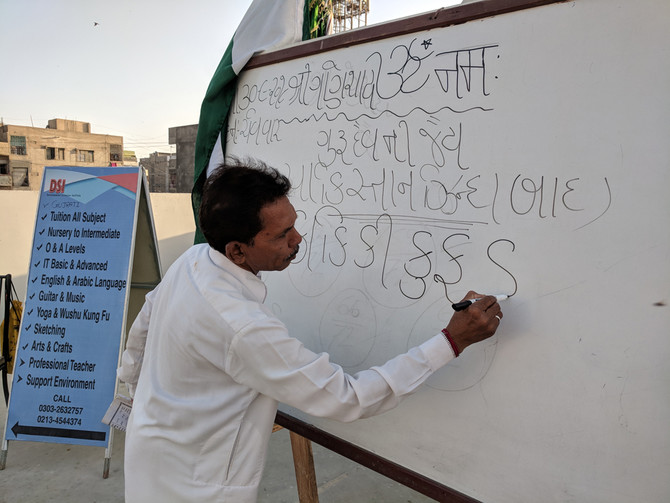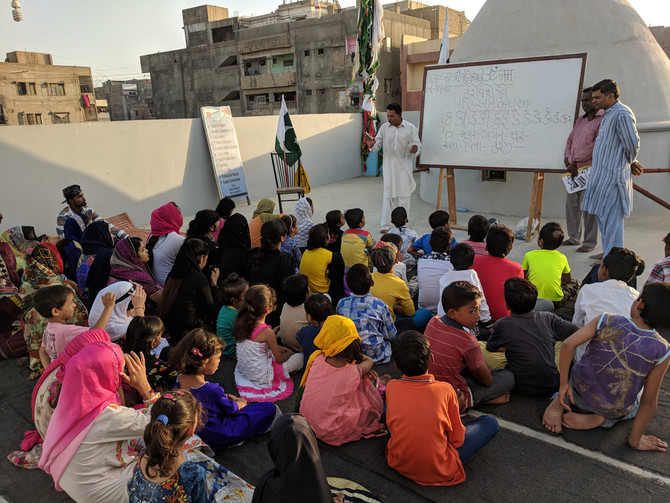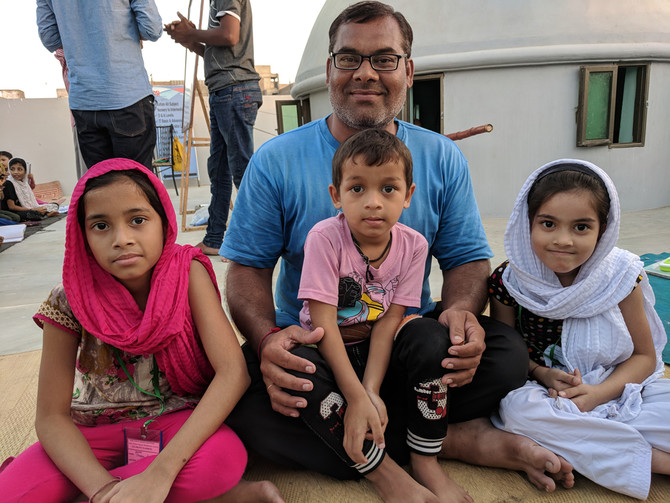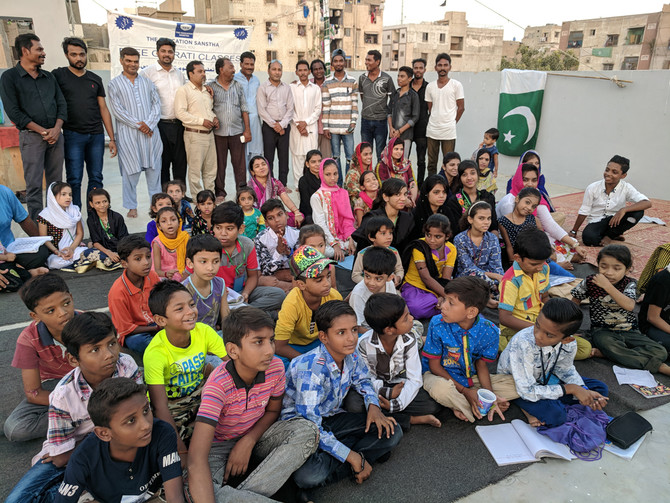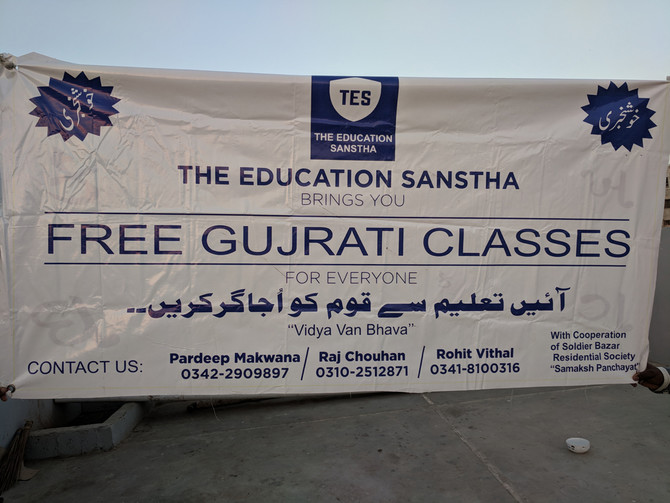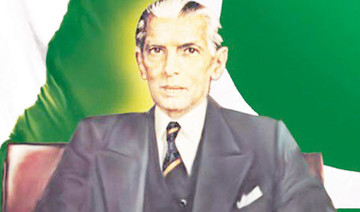KARACHI: Amit Kumar, a 37-year-old dweller of the Soldier Bazaar locality of Karachi, works as a peon in private firms during the day. After little rest in the evening, he takes his four children to the rooftop of a three-story Shri Ramdev Pir temple. At the top of this Hindu temple, however, there are no prayers. These are classes for Karachiites of Gujarati decent, who are fast forgetting their native language.
“Although I could speak my mother tongue, it would always bother me that I was not able to write and read Gujarati,” Kumar says. His children, Simren, 10, Nena, 6, and Gaurav, 4, are sitting by his side as he talks to Arab News.
This informal school is open from Monday to Saturday from 9 to 10 p.m.
“When I came to know that The Education Sanstha (TES) had started offering free Gujarati language classes, I took no time to get myself and my children registered,” he said. They would never be able to read and write Gujarati language had he not come across this opportunity, said Kumar.
Meenakshi Solanki, a nurse at a local hospital, was the first girl to join these free lessons. There are now 125 students and 53 of them are girls who took inspiration from Solanki to join this informal language school. “It was a boys-only class but when I joined the girls started coming,” she told Arab News.
According to Solanki, she is also the first member of her family who will be able to write and read Gujarati. “We deserve to be educated in our mother tongue but since it’s not part of the curriculum, TES has provided this golden opportunity to us,” she said, expressing her gratitude to a group of youngsters who launched this initiative.
Another student, 12-year-old Vivek Premji, said most of his family were still attached to the language. “Had these classes not been arranged, I would have been the first of my family to forget my mother tongue. My mother knew Gujarati but I didn’t. I was super-excited when I first heard about the classes,” Premji, who has been raised by a single mother, told Arab News.
Chander Kant Jethwa, an office-bearer of the TES, said his group of volunteers will help dropouts from the community to get back to schools. “We will also arrange special Urdu and English language classes for the dropouts to make them literate,” he told Arab News, adding that it was at one point that TES conceived the idea of beginning the Gujarati language classes.
Manoj Solanki, another group member, said his group kicked off classes on July 9, 2018 and, after getting an enormous response, they decided to expand the language program to other areas. “On September 26, we started classes in Keemari [area] and will soon take this #SaveGujarati initiative to different areas of the city,” he said.
Pandit Vital Das, one of the three teachers at this informal school, says Guajarati was part of the curriculum till 1975. For the next six years, the community continued to teach the language in different temples in the city. “In 1981, the education, however, completely stopped. Now, after 29 years, the city is having the first classes where students are being taught their mother language,” Das told Arab News.
These are not lower or lower-middle class areas where this important language is endangered.
Usman Ghani Saati, owner and editor of one of the two Gujarati language newspapers, has 23 siblings, including five sons, two daughters and 16 grandchildren. “Only two of my sons and one daughter, who are associated with our Watan Gujarati newspaper, can write and read the language,” Saati told Arab News.
The language is spoken by more than 50 million people in the world. In Karachi, the population of Gujarati-speaking people is estimated to be around 3.5 million, Saati said. Saati, who also worked with English daily Dawn between 1966 and 1983, bought Watan Gujarati when this oldest newspaper was founded by Muhammad Ali Jinnah in 1942 in Mumbai and later shifted, with the partition of India, to Karachi.
The circulation has witnessed massive cuts, Saati said, and the reason, he offered, is that Gujarati, despite being a mother tongue of top-notch industrialists, businessmen, stockbrokers, and owners of major media houses such as Dawn and ARY, is no longer taught at schools and spoken at homes. “Even the majority of the city’s schools were owned by Gujaratis but the irony is that none of them taught this language anymore,” Saati said.
“Once, the bank cheque in this city would also be written in Gujarati language. Now among 3.5 million, fewer than 10,000 may know the language,” he said.
Gujarati people have their distinctive proud culture and if the language continues to decline at this rate, the community will also lose their rich customs and traditions. Like his Watan, Millat Gujarati newspaper is also alive but the newspapers may not survive if the language continues to vanish.
Amid these fears of Saati and others, the Karachi’s youths have shown a path, which may lead to save the language from its complete death, even if it is not completely revived.
“We are proud of Gujarati language. It’s the language of the father of the nation. It’s the language of Edhi. It’s not only a language of Hindus but people of Gujarati descent belonging to different faiths,” Jethwa says.
“We urge all communities, including Parsi and Muslims, to come forward and join us in our #SaveGujarati initiative,” he said.
“We will soon hold meetings with different communities to request them for providing their community centers for such classes for a large number of people, who want to learn their mother tongue — a language that was spoken by Muhammad Ali Jinnah, Mohandas Gandhi and Abdul Sattar Edhi,” he says.
Karachi’s Gujarati speaking youth strive to revive Jinnah’s language
Karachi’s Gujarati speaking youth strive to revive Jinnah’s language

- Out of the 50 million Gujarati-speaking people in the world, around 3.5 million live in Karachi and these include top industrialists, businessmen and owners of big media houses
- Karachi’s Gujarati-speaking youth has launched The Education Sanstha (TES) as part of the #SaveGujarati initiative to keep their language from dying
PSL X: Babar’s 50 helps Peshawar Zalmi cruise to 7-wicket win over Lahore Qalandars

- Babar Azam scores unbeaten 56 runs from 42 balls while Hussain Talat smashes 51 runs
- With two wins under their belt, Zalmi next face Quetta Gladiators on Sunday, April 27
ISLAMABAD: Spurred on by a stellar half-century by skipper Babar Azam, Peshawar Zalmi beat Lahore Qalandars by seven wickets to register their second victory of the HBL Pakistan Super League (PSL) X edition in Lahore on Thursday.
Zalmi were set a modest total of 130 runs after Azam’s side bowled out the Qalandars for a modest 129 runs in 19.2 overs. Alzarri Joseph was the pick of the Zalmi bowlers with 3/15 figures while Luke Wood and Hussain Talat returned figures of 2/25 and 2/18, respectively.
The “Yellow Storm” ran into difficult earlier on during their chase, losing opener Saim Ayub for just 2 runs while star batter Tom Kohler-Cadmore fell for a duck. Azam kept his cool, scoring 56 runs from 42 balls and building partnerships with Mohammad Haris (20 off 16) and Hussain Talat (51 off 37) to see his team to the end.
“Not an ideal start for our home leg,” the Qalandars wrote on social media platform X. “Overwhelmed with the support of our home crowd, we will come back stronger!“
Qalandars skipper Shaheen Shah Afridi found his form with the ball, clocking in speeds of over 140 kilometers per hour frequently. The left-arm pacer was able to return figures of 2/22 from his four overs while speedster Haris Rauf finished with figures of 1/39 from 3.4 overs.
Zalmi now have two wins from five matches in the HBL PSL 10 edition so far, beating the Multan Sultans by 120 runs earlier in the tournament to register the largest win in PSL history. They are now placed at number four on the PSL points table, tied with four points with Lahore Qalandars.
Azam’s side will next take on Quetta Gladiators in the tournament on Apr. 27.
Sindh CM, Islamic Development Bank discuss housing, women empowerment projects

- IsDB is financing $200 million for reconstruction of houses for those affected by catastrophic 2022 floods
- Bank agrees to provide more support for water, sanitation, and hygiene projects in Sindh, says state media
ISLAMABAD: The chief minister of Pakistan’s southern Sindh province discussed housing for flood affectees and women empowerment projects with a high-level delegation of the Islamic Development Bank (IsDB), state-run media reported on Thursday.
The IsDB is financing $200 million for the reconstruction of houses for those affected by the catastrophic 2022 floods. Torrential rains and melting glaciers triggered flash floods across the country that killed over 1,700 people and caused damages worth $33 billion, according to Pakistan’s estimates.
Sindh Chief Minister Syed Murad Ali Shah met an IsDB delegation led by its Regional Director, Dr. Walid Abdelwahab, to discuss the Sindh Flood Emergency Housing Reconstruction Project (SFEHRP) and the Sindh Integrated Health and Women Empowerment Project. Both projects involve collaboration with the World Bank, the state-run Associated Press of Pakistan (APP) said.
“The chief minister welcomed Dr. Abdelwahab and expressed gratitude for the IsDB’s support in rebuilding homes for the flood-affected population,” APP reported.
Shah said the Sindh government, in partnership with international collaborators and NGOs, is actively implementing Water, Sanitation, and Hygiene (WASH) projects in various districts to improve public health, particularly in flood-affected and underserved communities.
“In response to the chief minister’s request, the IsDB agreed to provide additional support for the WASH project,” the report said.
Shah stressed that the SFEHRP and WASH projects have been designed to enable owner-driven, multi-hazard-resilient reconstruction of core housing units following the 2022 floods.
The Sindh Integrated Health and Women Empowerment Project is a $280 million initiative that includes financing of $50 million from the IsDB, $30 million from the Sindh government, and $200 million from foreign fund assistance (FFA).
Shah explained that the project aims to enhance the utilization and quality of reproductive, maternal, newborn, child, adolescent, and nutrition (RMNCAH+N) services for poor and vulnerable populations, particularly adolescents and women, in targeted areas of the province.
“The process to hire a third-party firm to oversee the skill development of 6,000 eligible women has begun in consultation with the IsDB,” the APP said.
As part of the program, 124 government dispensaries will be rehabilitated and upgraded, with diagnostic and preliminary design reports already completed, the state-run media said.
Roadside bombing in southwestern Pakistan kills 3, injures 5

- Blast was caused by bomb planted in a road in Balochistan’s district Kalat, says government official
- No group has claimed responsibility but suspicion is likely to fall on separatist Baloch Liberation Army
QUETTA: Three people were killed while five others were injured in southwestern Pakistan on Thursday after a vehicle was struck by a powerful roadside blast, a government official said.
The blast took place in Balochistan’s Kalat district in a remote mountainous area known as Union Council Kaboto, located around 46 kilometers from Kalat city. Two women were among the three killed in the attack which was triggered by an explosive device planted on the road, Kalat Deputy Commissioner Jameel Ahmed said.
“A vehicle passing the area was hit by the explosion, killing three people including two women and injuring five others,” Baloch said.
The official said the driver of the vehicle was also killed in the blast, which was carrying women passengers to Ameeri area in Kalat district. He said the injured had been shifted to Kalat Teaching Hospital for medical treatment.
“The district administration and [paramilitary] Levies force commenced an investigation to ascertain who was the target of this latest attack,” Baloch said.
No group immediately claimed responsibility for the attack. However, ethnic Baloch separatist groups, mainly the Baloch Liberation Army (BLA), often target soldiers of Pakistan’s armed forces, passengers from the eastern Punjab province, and locals and tribal elders they consider backed by the state.
Pakistan’s largest but least developed Balochistan province shares borders with Iran and Afghanistan. It has long been the site of low-scale insurgency by Baloch separatist groups, who accuse Islamabad of exploiting the province’s natural resources and denying locals a share in its natural resources.
Pakistan’s government and military denies these allegations, claiming that the federal and provincial governments have prioritized Balochistan’s development through various health, education and infrastructure projects.
Pakistan pauses controversial canals project amid protests in Sindh

- Nationalist parties, civil society members in fear project to build canals on River Indus will trigger water shortages
- Shehbaz Sharif says there will be no further progress on canals until all provinces reach a consensus over the matter
ISLAMABAD: Prime Minister Shehbaz Sharif announced on Thursday that the federal government will pause constructing new canals on River Indus until a consensus develops between Pakistan’s provinces on the matter, following outrage and sit-in protests in Sindh.
Pakistan’s government launched an ambitious agricultural project in February to build a network of six canals on River Indus. The government says it aims to irrigate millions of acres of barren lands and ensure food security for the 240-million strong country.
However, critics say the project would trigger water shortages in the southern parts of the country, especially Sindh. Lawyers, members of the civil society and supporters of nationalist parties in Sindh have disrupted trade and traffic on the province’s National Highway since last Friday, staging sit-in protests over the issue.
Pakistan Peoples Party (PPP), a key ally of the ruling coalition led by Sharif and the largest party in Sindh, has led protests against the project. PPP Chairman Bilawal Bhutto Zardari met Sharif on Thursday to discuss the canals issue and Pakistan’s prevailing tensions with India.
“We must resolve this issue through mutual consent and dialogue,” Sharif said with Bhutto Zardari by his side. “And today, in the meeting held between the Pakistan Peoples Party and the Pakistan Muslim League (Nawaz), we have mutually agreed that no new canals will be constructed until a decision is reached via consensus in the Council of Common Interests (CCI).”
The CCI is a constitutional body whose members are appointed by the president on the advice of the prime minister. The council resolves power-sharing and other disputes between the federation and the provinces.
Sharif said the center had decided that there will be “no further progress” on canal-related matters unless a consensus is developed among provinces.
“Therefore, we have decided today that a meeting of the Council of Common Interests will be convened on Friday, May 2, in which the Pakistan Peoples Party and the Pakistan Muslim League-Nawaz, and the federal government’s decisions will be endorsed,” he added.
Bhutto Zardari thanked the prime minister for listening to his concerns regarding the issue, saying that the CCI meeting will endorse the decision that no new canals would be constructed without consensus on the matter.
“Today, we are not taking a decision together but are merely agreeing that without consensus on water-related matters, no new canals are being made,” he said.
The PPP last week threatened to withdraw its support for Sharif’s ruling coalition government if it decided to go ahead with building the new canals. Bhutto Zardari’s party, which emerged as the second-largest political party after the controversial 2024 general election in Pakistan, Sharif get elected prime minister last year.
The PPP settled for the presidency and governorships in Punjab and Khyber Pakhtunkhwa (KP) provinces, areas where it performed poorly in the national polls.
Islamabad says India planning ‘wave of terrorism’ in Pakistani cities, vows ‘tit-for-tat’ response

- Suspected militants killed 26 people at a popular tourist attraction in Indian-administered Kashmir’s Pahalgam area
- Both countries have since taken slew of retaliatory measures including closing only land border, suspending special visas
ISLAMABAD: Defense Minister Khawaja Muhammad Asif on Thursday accused India of preparing to launch a “wave of terrorism” in Pakistani cities, warning that Islamabad would retaliate with a “tit-for-tat” response as relations between the nuclear-armed rivals plummeted following a deadly militant attack in Kashmir.
On Tuesday, gunmen killed 26 men at a tourist site in the Pahalgam area of Indian-administered Kashmir in the worst attack on civilians in the country in nearly two decades. India alleged cross-border involvement, without offering proof, and announced a raft of measures to downgrade ties on Wednesday including suspending a six-decade-old river-sharing treaty as well as closing the only land crossing between the neighbors. Pakistan followed with its own actions that included shutting its airspace to Indian planes and rejecting New Delhi’s suspension of the critical water agreement.
Islamabad warned Delhi the suspension of the Indus Waters Treaty would be seen as an “act of war” to which Pakistan would respond with “full force across the complete spectrum of national power.”
The nuclear-armed nations, who have both fought two out of three wars over the disputed region of Kashmir since 1947, frequently accuse each other of carrying out cross-border attacks.
“According to our information, India is preparing to launch a wave of terrorism in various Pakistani cities instead of opting for an all-out war,” Asif told reporters at a news briefing.
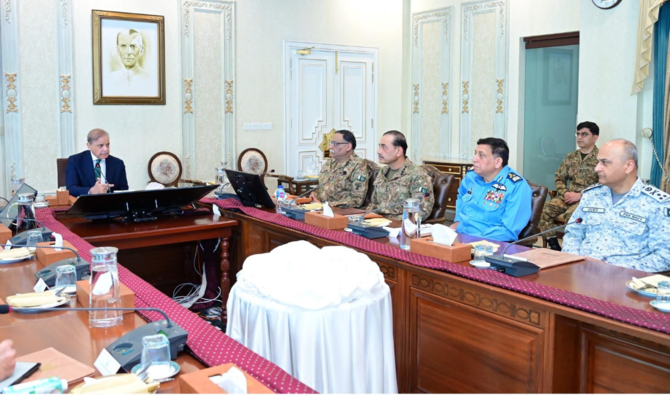
“And I want to make it absolutely clear that we are fully prepared to counter this wave of terrorism.”
Asif and three other federal ministers were briefing the media on Pakistan’s retaliatory measures, including that Islamabad would exercise the right to hold all bilateral agreements with India, including but not limited to the 1972 Simla Agreement, in abeyance. In the absence of the Simla deal, India loses its rationale for wanting the Kashmir dispute to be treated as a bilateral dispute that must be settled only through bilateral negotiations. Under the treaty, New Delhi has consistently denied any third party intervention in the conflict, even from the United Nations.
Pakistan also closed the Attari-Wagah land border, the only operational land port between the two nations, with immediate effect and suspended all cross-border transit from India through this route “without exception.”
With no direct flights operating between the two countries, the move cuts all transport links between them.
Islamabad also suspended all visas under the SAARC Visa Exemption Scheme (SVES) issued to Indian nationals, deeming them canceled with immediate effect, with the exception of Sikh pilgrims who frequently travel to Pakistan to visit religious sites. Pakistan gave Indian nationals currently in Pakistan under SVES 48 hours to leave, and said Indian defense, naval and air advisers in Islamabad had been declared “persona non grata.”
“Our response will be tit-for-tat, four citizens are targeted, Indian citizens will also not remain safe in their cities,” the defense minister said.
Asif warned that even if a single Pakistani citizen was killed in an Indian-planned “terrorist” attack, Delhi would “pay for it.”
“This should be absolutely clear to them,” he said.
“BLAME GAME”
The Indus Waters Treaty, brokered by the World Bank in 1960, allocates the six Indus Basin rivers between India and Pakistan, with the Bank acting as its guarantor.
Pakistan has rights to the western rivers — Indus, Jhelum, and Chenab — for irrigation, drinking, and non-consumptive uses like hydropower. India controls the eastern rivers — Ravi, Beas, and Sutlej — for unrestricted use but must not significantly alter their flow.
Law Minister Azam Nazeer Tarar, who addressed the news conference alongside Asif, said the treaty was “sacred” for Pakistan and could not legally be “unilaterally” terminated.
“Pakistan has all the avenues and options available at the international level under the Indus Waters Treaty and the Vienna Convention and will exercise them if the treaty is unilaterally suspended,” he said.
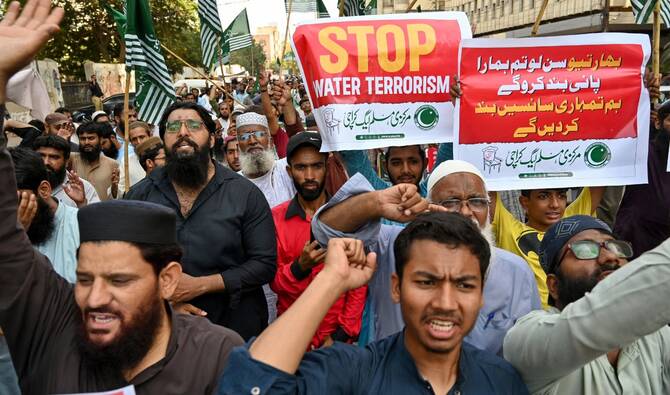
Pakistan and India both claim Kashmir in full but rule it in part. India has long accused Pakistan of helping Islamist separatists who have battled security forces in its part of the territory, accusations Islamabad denies.
Indian officials have said Tuesday’s attack had “cross-border linkages” and Kashmiri police, in notices identifying three people “involved” in the violence, said two of them were Pakistani nationals. India has not elaborated on the links or shared proof.
Pakistan has said India’s accusations were made without any “credible investigation” or “verifiable evidence,” saying they are “frivolous” and “devoid of rationality.”
It has also called on India to refrain from a “reflexive blame game” and to take responsibility for its “failure to provide security” to people.


